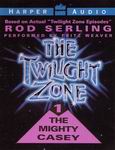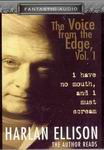
 The Twilight Zone No. 1 – The Mighty Casey
The Twilight Zone No. 1 – The Mighty Casey
By Rod Serling; Read by Fritz Weaver
1 cassette – 75 minutes [UNABRIDGED]
Publisher: Harper Audio
Published: 1992 – Out Of Print
ISBN: 1559946598
Themes: / Fantasy / Baseball / Robots / Humor /
Submitted for your approval…
Rod Serling’s The Twilight Zone is revived for audio in the form of unabridged short stories by Rod Serling. All the stories in this series were previously adapted for the original Twilight Zone television series. This is the first in a series of six single cassette adaptations read by stars of the original series. In this case, Fritz Weaver spins the tale of “The Mighty Casey”, an almost mythical player for that near-mythical sport of baseball. The Brooklyn Dodgers were down in the dumps until tryouts turned up a talented left hander with a pitch like nobody’s business. Casey, the pitcher “with an exceptional left hand”, inspires the tired old players to new glory. They become the team to beat. Everything was swell until Casey gets beaned by a ball. A doctor is summoned and pronounces that Casey is alright, but then the doctor has trouble finding a pulse. It’s soon discovered that Casey is actually a robot and as such does not have a heart!
When thinking of baseball, most people probably associate the name Casey with the Ernest Lawrence Thayer’s 1888 poem “Casey At The Bat”. It’s clear to me that Rod Serling tapped into it for inspiration. “The Mighty Casey” is a very funny story. The dialogue is humorous and the situation is funny too, but it also has a lot of pathos. The story is entertaining but also has that most important of Twilight Zone elements, a twist with a satisfying ending. Fritz Weaver has great fun playing the characters, especially Mouth McGarry, the comic manager of the Dodgers, a character full of deep anxiety and deeper ignorance. This is pretty light material for The Twilight Zone, which often deals with the darker elements of the Human condition. Presented like an actual episode of the television series, there’s the haunting Twilight Zone music and an introduction just like Serling used to make. I actually listened to the tale twice, and I enjoyed it even more the second time around. Overall its a very good start to the series.
Posted by Jesse Willis
 A Game of Thrones
A Game of Thrones Neverwhere
Neverwhere Alien Voices: The Invisible Man
Alien Voices: The Invisible Man
 The Voice from the Edge Vol 1: I Have No Mouth and I Must Scream
The Voice from the Edge Vol 1: I Have No Mouth and I Must Scream The Wind from a Burning Woman
The Wind from a Burning Woman